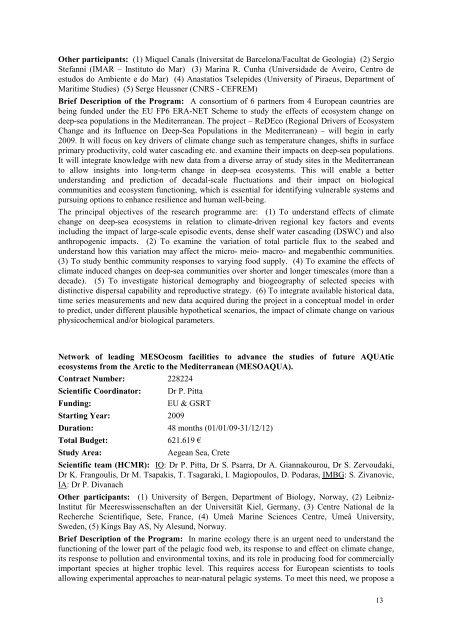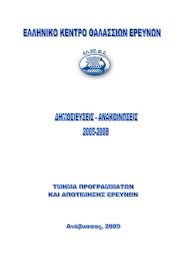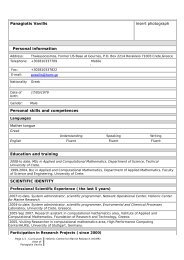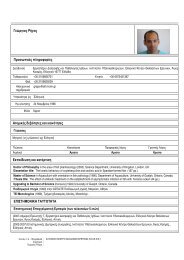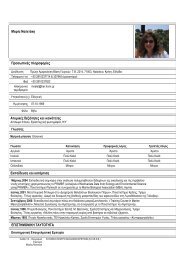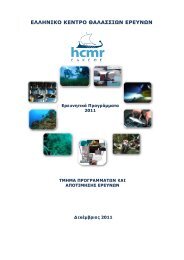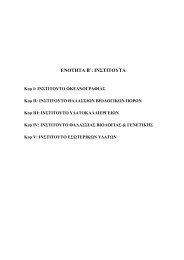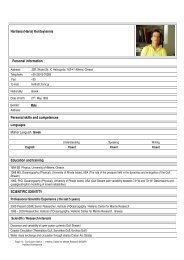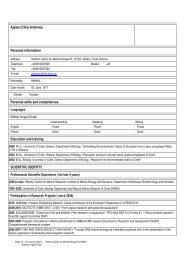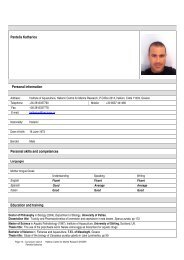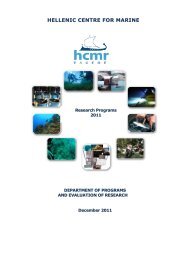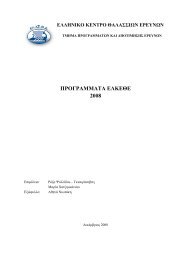2009 Research Programmes of the HCMR - Hellenic Centre for ...
2009 Research Programmes of the HCMR - Hellenic Centre for ...
2009 Research Programmes of the HCMR - Hellenic Centre for ...
Create successful ePaper yourself
Turn your PDF publications into a flip-book with our unique Google optimized e-Paper software.
O<strong>the</strong>r participants: (1) Miquel Canals (Iniversitat de Barcelona/Facultat de Geologia) (2) Sergio<br />
Stefanni (IMAR – Instituto do Mar) (3) Marina R. Cunha (Universidade de Aveiro, Centro de<br />
estudos do Ambiente e do Mar) (4) Anastatios Tselepides (University <strong>of</strong> Piraeus, Department <strong>of</strong><br />
Maritime Studies) (5) Serge Heussner (CNRS - CEFREM)<br />
Brief Description <strong>of</strong> <strong>the</strong> Program: A consortium <strong>of</strong> 6 partners from 4 European countries are<br />
being funded under <strong>the</strong> EU FP6 ERA-NET Scheme to study <strong>the</strong> effects <strong>of</strong> ecosystem change on<br />
deep-sea populations in <strong>the</strong> Mediterranean. The project – ReDEco (Regional Drivers <strong>of</strong> Ecosystem<br />
Change and its Influence on Deep-Sea Populations in <strong>the</strong> Mediterranean) – will begin in early<br />
<strong>2009</strong>. It will focus on key drivers <strong>of</strong> climate change such as temperature changes, shifts in surface<br />
primary productivity, cold water cascading etc. and examine <strong>the</strong>ir impacts on deep-sea populations.<br />
It will integrate knowledge with new data from a diverse array <strong>of</strong> study sites in <strong>the</strong> Mediterranean<br />
to allow insights into long-term change in deep-sea ecosystems. This will enable a better<br />
understanding and prediction <strong>of</strong> decadal-scale fluctuations and <strong>the</strong>ir impact on biological<br />
communities and ecosystem functioning, which is essential <strong>for</strong> identifying vulnerable systems and<br />
pursuing options to enhance resilience and human well-being.<br />
The principal objectives <strong>of</strong> <strong>the</strong> research programme are: (1) To understand effects <strong>of</strong> climate<br />
change on deep-sea ecosystems in relation to climate-driven regional key factors and events<br />
including <strong>the</strong> impact <strong>of</strong> large-scale episodic events, dense shelf water cascading (DSWC) and also<br />
anthropogenic impacts. (2) To examine <strong>the</strong> variation <strong>of</strong> total particle flux to <strong>the</strong> seabed and<br />
understand how this variation may affect <strong>the</strong> micro- meio- macro- and megabenthic communities.<br />
(3) To study benthic community responses to varying food supply. (4) To examine <strong>the</strong> effects <strong>of</strong><br />
climate induced changes on deep-sea communities over shorter and longer timescales (more than a<br />
decade). (5) To investigate historical demography and biogeography <strong>of</strong> selected species with<br />
distinctive dispersal capability and reproductive strategy. (6) To integrate available historical data,<br />
time series measurements and new data acquired during <strong>the</strong> project in a conceptual model in order<br />
to predict, under different plausible hypo<strong>the</strong>tical scenarios, <strong>the</strong> impact <strong>of</strong> climate change on various<br />
physicochemical and/or biological parameters.<br />
Network <strong>of</strong> leading MESOcosm facilities to advance <strong>the</strong> studies <strong>of</strong> future AQUAtic<br />
ecosystems from <strong>the</strong> Arctic to <strong>the</strong> Mediterranean (MESOAQUA).<br />
Contract Number: 228224<br />
Scientific Coordinator:<br />
Funding:<br />
Starting Year: <strong>2009</strong><br />
Dr P. Pitta<br />
EU & GSRT<br />
Duration: 48 months (01/01/09-31/12/12)<br />
Total Budget: 621.619 €<br />
Study Area:<br />
Aegean Sea, Crete<br />
Scientific team (<strong>HCMR</strong>): IO: Dr P. Pitta, Dr S. Psarra, Dr Α. Giannakourou, Dr S. Zervoudaki,<br />
Dr Κ. Frangoulis, Dr Μ. Τsapakis, Τ. Τsagaraki, Ι. Μagiopoulos, D. Podaras, IMBG: S. Zivanovic,<br />
IA: Dr P. Divanach<br />
O<strong>the</strong>r participants: (1) University <strong>of</strong> Bergen, Department <strong>of</strong> Biology, Norway, (2) Leibniz-<br />
Institut für Meereswissenschaften an der Universität Kiel, Germany, (3) <strong>Centre</strong> National de la<br />
Recherche Scientifique, Sete, France, (4) Umeå Marine Sciences <strong>Centre</strong>, Umeå University,<br />
Sweden, (5) Kings Bay AS, Ny Alesund, Norway.<br />
Brief Description <strong>of</strong> <strong>the</strong> Program: In marine ecology <strong>the</strong>re is an urgent need to understand <strong>the</strong><br />
functioning <strong>of</strong> <strong>the</strong> lower part <strong>of</strong> <strong>the</strong> pelagic food web, its response to and effect on climate change,<br />
its response to pollution and environmental toxins, and its role in producing food <strong>for</strong> commercially<br />
important species at higher trophic level. This requires access <strong>for</strong> European scientists to tools<br />
allowing experimental approaches to near-natural pelagic systems. To meet this need, we propose a<br />
13


